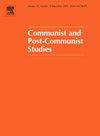普京政权合法化
IF 1.3
4区 社会学
Q3 INTERNATIONAL RELATIONS
引用次数: 1
摘要
这篇文章关注了普京执政20年来俄罗斯后苏联过渡的官方叙事的转变。为了发现政治制度向威权主义的逐步演变是如何合法化的,它重点比较了2000年至2020年总统在联邦议会的讲话中所阐述的简洁叙述。研究方法是计算机辅助的定性内容分析。这篇文章揭示了现代俄罗斯发展的各个阶段是如何与西方不断演变的代表相关联的。随着时间的推移,建立民主、市场经济和法治的最初目标要么被重新解释,要么被分解为次要的实际任务。最经常明确的政策目标是提高人民的生活水平,这被描述为克服苏联解体和20世纪90年代艰难时期的创伤。在演讲中,俄罗斯成为一个在2012年至2018年间完成过渡的国家,恢复了其国际地位和军事实力,并为改善社会福利提供了资源。宣布建立“民主社会”;然而,这个术语与正式选举和促进公民参与有关,而不是与权力的交替和问责制有关。本文章由计算机程序翻译,如有差异,请以英文原文为准。
Legitimizing Putin’s Regime
This article follows the transformations of the official narrative about Russia’s post-Soviet transition over 20 years of Putin’s stay in power. To detect how the gradual evolution of political regime toward authoritarianism was legitimized, it focuses on comparison of concise narratives articulated in the Presidential Addresses to the Federal Assembly between 2000 and 2020. The method of research is computer-assisted qualitative content analysis. The article reveals how the declared stages of modern Russia’s development correlated with the evolving representations of the West. The initial goals of establishing democracy, the market economy, and the rule of law over time were either reinterpreted or dissolved into minor practical tasks. The most often articulated policy goal was raising the people’s living standards, which was narrated as overcoming the trauma of the collapse of the Soviet Union and the hard 1990s. In the Addresses, Russia became represented as a country that completed its transition between 2012 and 2018, with restoring its international positions and military strength, as well as resources for better social welfare. The “democratic society” was declared to be instituted; however, this term was associated with formal elections and facilitating civic participation, not with the alternation and accountability of power.
求助全文
通过发布文献求助,成功后即可免费获取论文全文。
去求助
来源期刊

Communist and Post-Communist Studies
Multiple-
CiteScore
1.90
自引率
0.00%
发文量
23
期刊介绍:
Communist and Post-Communist Studies is an international journal covering all communist and post-communist states and communist movements, including both their domestic policies and their international relations. It is focused on the analysis of historical as well as current developments in the communist and post-communist world, including ideology, economy and society. It also aims to provide comparative foci on a given subject by inviting comments of a comparative character from scholars specializing in the same subject matter but in different countries.
 求助内容:
求助内容: 应助结果提醒方式:
应助结果提醒方式:


